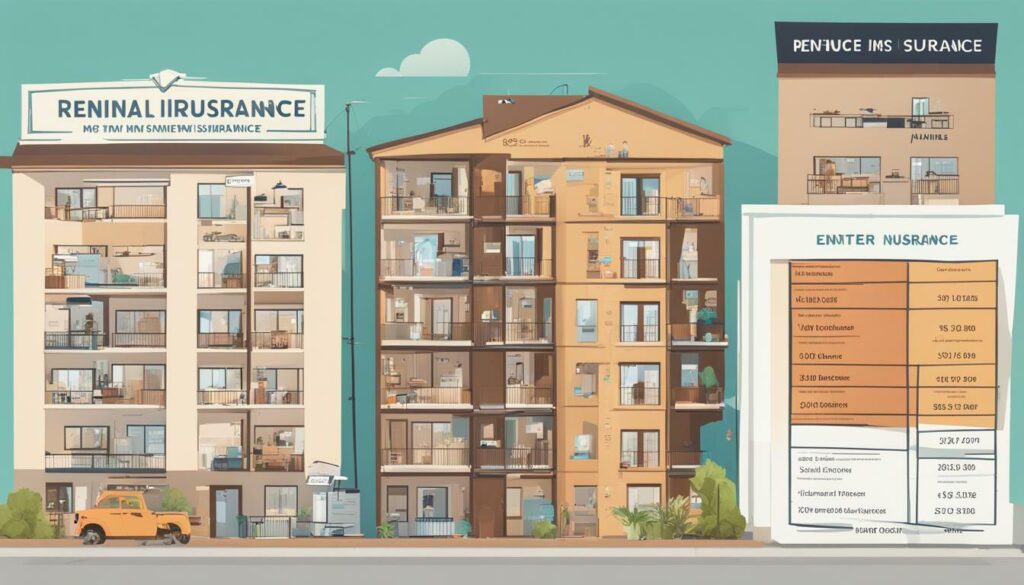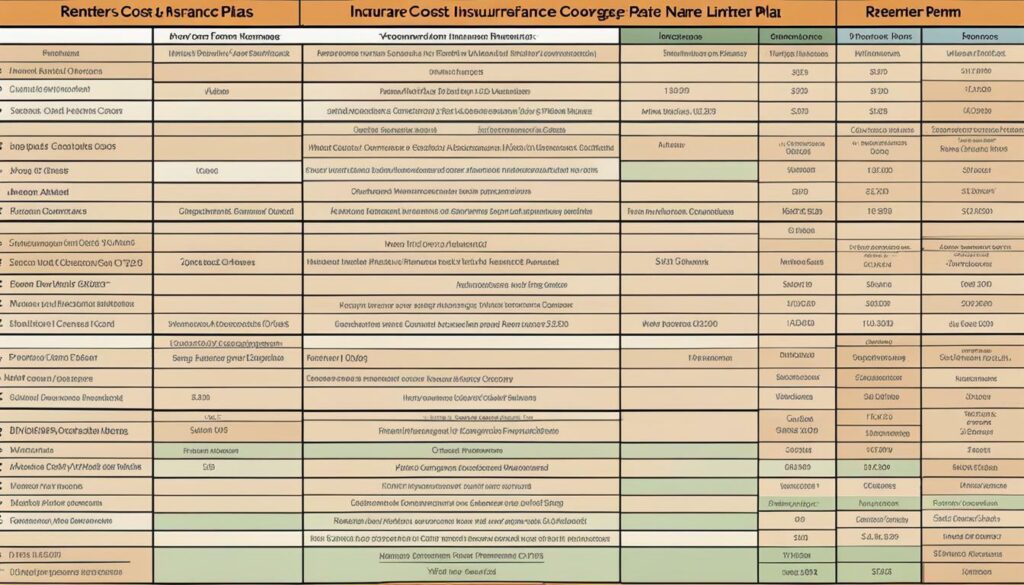If you’re a renter, you may be wondering how much renters insurance costs. The answer can vary depending on several factors, but it’s important to understand the average prices you can expect. Renters insurance is designed to protect your personal belongings and offer liability coverage for incidents that may occur in your rental space.
Factors that can affect the cost of renters insurance include your location, the amount of coverage you choose, and your insurance provider. It’s important to consider these factors when shopping for renters insurance to find the policy that best suits your needs and budget.
Key Takeaways:
- The cost of renters insurance varies depending on your location, coverage amount, and insurance provider.
- Understanding the average cost of renters insurance can help you determine what is a reasonable price to pay.
- Factors such as security features in your rental space and your insurance deductible can also impact the cost of renters insurance.
Understanding Renters Insurance Coverage
When it comes to renters insurance, it’s important to understand the coverage you’re getting. While standard policies offer similar coverage, rates can vary based on the level of protection you need. Here’s a breakdown of the different types of coverage you can expect:
| Coverage | Description |
|---|---|
| Personal Property | This coverage protects your personal belongings against theft, damage, or loss due to covered events. |
| Liability | If someone gets injured while on your rental property, liability coverage can help pay for medical expenses and legal fees. |
| Loss of Use | If your rental is damaged or destroyed, this coverage can help pay for temporary living expenses, such as a hotel or rental home. |
The cost of renters insurance rates can vary depending on the level of coverage you choose. While it can be tempting to choose the minimum coverage, it’s important to consider your individual circumstances. For example, if you have expensive electronics or jewelry, you may need more than the standard protection.
When shopping for renters insurance coverage, be sure to review the policy carefully, paying attention to any exclusions or limitations. It’s also a good idea to compare rates from multiple providers to find the best renters insurance coverage at a price that fits your budget.


Factors Affecting Renters Insurance Cost
When it comes to renters insurance, the cost can vary depending on various factors. Understanding these factors can help you make informed decisions when choosing a policy that meets your needs and budget. Below are some factors that can affect the cost of renters insurance:
| Factor | Description |
|---|---|
| Location | The location of your rental property can impact the cost of renters insurance. If you live in an area that is prone to natural disasters, such as hurricanes or earthquakes, your insurance rates may be higher. |
| Coverage Amount | The amount of coverage you choose can impact the cost of your renters insurance. The more coverage you have, the higher your premiums will be. |
| Deductible | The deductible is the amount you pay out of pocket before your insurance kicks in. Choosing a higher deductible can lower your monthly premiums, but means you’ll be responsible for more of the cost in case of a claim. |
| Credit Score | Your credit score can also affect the cost of renters insurance. Insurers view customers with lower credit scores as higher risk, and may charge them higher premiums as a result. |
| Previous Claims | If you’ve filed claims on previous renters insurance policies, your rates may be higher as a result. Insurance companies view customers who have filed claims in the past as higher risk. |
Keep in mind that every insurance company has its own method for calculating premiums, so rates can vary between providers. It’s important to shop around and compare quotes to ensure you’re getting the best deal for your needs.


Section 4: Average Cost of Renters Insurance
Looking at the bigger picture, how much can you expect to pay for renters insurance? The national average cost of renters insurance falls between $15 and $20 per month, or roughly $180 to $240 annually. Keep in mind this is just a general estimate and prices can vary greatly depending on several factors, including your location, the amount of coverage you choose, and the deductible you opt for.
When it comes to location, rates can be influenced by various demographic and geographic factors like population density, crime rates, and natural disasters. For example, if you live in a high-risk area for storms, hurricanes, or wildfires, your premium might be higher to account for the increased likelihood of damages or losses.
To give you a more specific idea of how much renters insurance costs in your state, we’ve put together a table below:
| State | Average Annual Premium |
|---|---|
| Alabama | $239 |
| Alaska | $184 |
| Arizona | $185 |
| Arkansas | $212 |
| California | $210 |
| Colorado | $176 |
| Connecticut | $181 |
| Delaware | $159 |
| District of Columbia | $200 |
| Florida | $181 |
| Georgia | $222 |
| Hawaii | $231 |
| Idaho | $149 |
| Illinois | $190 |
| Indiana | $197 |
| Iowa | $154 |
| Kansas | $182 |
| Kentucky | $183 |
| Louisiana | $244 |
| Maine | $139 |
| Maryland | $162 |
| Massachusetts | $192 |
| Michigan | $182 |
| Minnesota | $137 |
| Mississippi | $229 |
| Missouri | $188 |
| Montana | $147 |
| Nebraska | $154 |
| Nevada | $182 |
| New Hampshire | $155 |
| New Jersey | $189 |
| New Mexico | $193 |
| New York | $213 |
| North Carolina | $159 |
| North Dakota | $132 |
| Ohio | $181 |
| Oklahoma | $213 |
| Oregon | $167 |
| Pennsylvania | $159 |
| Puerto Rico | $246 |
| Rhode Island | $189 |
| South Carolina | $188 |
| South Dakota | $129 |
| Tennessee | $198 |
| Texas | $233 |
| Utah | $149 |
| Vermont | $140 |
| Virginia | $149 |
| Washington | $159 |
| West Virginia | $190 |
| Wisconsin | $147 |
| Wyoming | $139 |


Keep in mind that these figures are only intended as a general reference and may not reflect the exact amount you’ll pay for renters insurance in your area. That being said, it’s always a good idea to shop around and compare quotes from different providers to find the best coverage at the most affordable rate.
How to Compare Renters Insurance Quotes
When looking for renters insurance, it’s important to compare quotes to ensure you get the right coverage at the most affordable rate. Here are some tips to help you compare renters insurance quotes:
1. Determine Your Coverage Needs
Before you start comparing quotes, you need to determine how much coverage you need. Consider the value of your personal belongings, the cost of replacing them, and any additional coverage you may require. Once you have a clear idea of your coverage needs, you can start requesting quotes.
2. Gather Quotes from Multiple Providers
Don’t settle for the first renters insurance quote you receive. Shop around and gather quotes from multiple providers to compare coverage and rates. You can request quotes online or through an insurance agent. It’s essential to compare similar policies to make an informed decision.


3. Review Policy Terms and Conditions
When you receive a renters insurance quote, review the policy terms and conditions before making a final decision. Pay attention to the coverage limits, deductible, and any exclusions. Ask questions if there are any terms you don’t understand.
4. Consider Bundling Policies
If you have other insurance policies, such as auto or life insurance, consider bundling them with your renters insurance. This can often lead to discounts and lower premiums.
5. Don’t Sacrifice Coverage for Price
While it’s important to find affordable renters insurance, don’t sacrifice coverage for price. Make sure you have enough coverage to protect your personal belongings and liability.
By following these tips, you can compare renters insurance quotes and find the coverage that best fits your needs and budget.
Finding Cheap Renters Insurance
If you’re on a tight budget, finding cheap renters insurance can be a daunting task. But don’t worry, it’s certainly possible to find good coverage at an affordable cost. Here are some tips to help you find the best deal on renters insurance:
Shop Around
The most effective way to find cheap renters insurance is to compare quotes from different providers. This can be done online or by contacting insurance companies directly. Be sure to compare coverage levels and prices to make an informed decision.
Consider a Higher Deductible
Raising your deductible can lower your monthly premiums, but keep in mind that you’ll have to pay more out of pocket if you file a claim. Make sure you can afford the deductible before choosing this option.
Bundle Your Policies
If you have auto or other insurance policies, consider bundling them with your renters insurance to qualify for a multi-policy discount.
Ask About Discounts
Many insurance companies offer discounts for various reasons such as safety features, good credit, or being a member of certain organizations. It never hurts to ask about available discounts that may apply to you.


By following these tips and doing your research, you can find quality renters insurance coverage at a cost that fits your budget. Don’t risk being without coverage, protect yourself and your belongings today.
Additional Coverages and Endorsements
Aside from standard coverage, renters insurance may offer additional coverages and endorsements that can provide extra protection for your belongings. Some common additional coverages include:
- Identity theft coverage – This coverage helps protect you in case of identity theft or fraud. It can cover expenses such as legal fees, lost wages, and more.
- Flood insurance – Depending on where you live, you may need additional coverage for flood damage. Standard renters insurance policies typically don’t cover flooding.
- Jewelry and valuable items coverage – If you have expensive jewelry, artwork, or other valuable items, you may want to consider additional coverage to protect these items.
- Earthquake insurance – If you live in an earthquake-prone area, you may need to purchase additional coverage to protect yourself from earthquake damage.
Adding these additional coverages to your policy may increase your premiums, but it can give you peace of mind knowing that you have extra protection for your belongings.
Endorsements are another type of additional coverage that can be added to your policy. Endorsements are typically designed to provide coverage for specific items or situations that may not be covered by your standard policy. Some common endorsements include:
- Replacement cost endorsement – This endorsement can help ensure that you receive enough money to replace a lost or damaged item with a new one, rather than just receiving its current value.
- Water backup endorsement – This endorsement can provide additional coverage for damages caused by water backup or sump pump failure.
- Animal liability endorsement – If you have a pet, you may want to consider this endorsement to protect yourself in case your pet causes damage to someone else’s property or injures someone.
When considering additional coverages and endorsements, it’s important to evaluate your specific needs and determine what level of protection is necessary for you. An insurance agent can help you determine which options are right for you.


Understanding Renters Insurance Discounts
When looking for ways to reduce your renters insurance cost, consider taking advantage of discounts offered by insurance providers. These discounts can significantly lower your premiums and make renters insurance more affordable.
Here are some of the most common renters insurance discounts you can explore:
| Discount Type | Description |
|---|---|
| Bundle Discount | If you have multiple policies with the same insurance company, such as car insurance and renters insurance, you may be eligible for a bundle discount. |
| Security Devices Discount | Some insurance companies offer discounts for installing security devices like smoke detectors, burglar alarms, and deadbolts in your rental unit. |
| Claims-Free Discount | If you maintain a claims-free record for a specific period, such as one or two years, some insurers may offer a discount on your renters insurance rates. |
| Good Credit Discount | Having a good credit score can often result in a lower renters insurance cost. Insurance providers see clients with good credit scores as lower-risk policyholders. |
To take advantage of these renters insurance discounts, communicate with your insurance provider and ask about any discounts they offer. Don’t forget to compare your options to find the best deals and explore different insurance providers to see which discounts you qualify for.


Conclusion
Congratulations! You’ve made it to the end of our guide to understanding the cost of renters insurance. By now, you should have a good idea of the factors that affect the cost of renters insurance and how to find affordable coverage that fits your needs.
Remember, renters insurance is an investment in your future peace of mind. While it may seem like an unnecessary expense, it can save you from financial ruin in the event of an unexpected disaster or theft.
We hope this guide has been helpful in answering your questions about renters insurance rates, coverage, and discounts. Keep in mind that rates can vary depending on your location, coverage needs, and other factors. It’s always a good idea to shop around and compare quotes from different insurance providers to find the best deal.
Don’t hesitate to reach out to a reputable renters insurance provider to learn more about your options and get a personalized quote. You never know when you may need the protection and peace of mind that renters insurance can provide.
FAQ
Q: How much does renters insurance typically cost?
A: The cost of renters insurance can vary depending on factors such as your location, the amount of coverage you choose, and your personal circumstances. On average, renters insurance can range from $10 to $30 per month.
Q: What does renters insurance coverage include?
A: Renters insurance typically provides coverage for your personal belongings, liability protection, and additional living expenses in case you need to temporarily relocate due to a covered event, such as a fire or theft.
Q: What factors can affect the cost of renters insurance?
A: Several factors can influence the cost of renters insurance, including your location, the value of your belongings, the level of coverage you choose, and your deductible. Additionally, factors such as your credit history and the presence of safety features in your rental property can also impact the cost.
Q: What is the average cost of renters insurance in the United States?
A: The average cost of renters insurance in the United States is approximately $180 to $300 per year. However, keep in mind that this can vary depending on several factors, such as your location and the level of coverage you choose.
Q: How can I compare renters insurance quotes?
A: To compare renters insurance quotes, it’s important to gather quotes from multiple insurance providers. Consider factors such as coverage limits, deductibles, and any additional features or endorsements offered. Don’t forget to also review customer reviews and ratings to help you make an informed decision.
Q: How can I find cheap renters insurance?
A: Finding cheap renters insurance is possible by shopping around, comparing quotes, and exploring available discounts. Additionally, adjusting your coverage limits and increasing your deductible can help lower your premiums. However, it’s important to ensure that you still have adequate coverage for your needs.
Q: Are there additional coverages and endorsements available for renters insurance?
A: Yes, apart from standard coverage, renters insurance may offer additional coverages and endorsements. These can include coverage for high-value items, identity theft protection, and sewer backup coverage. It’s important to review your policy and discuss your specific needs with your insurance provider.
Q: What discounts are available for renters insurance?
A: Renters insurance providers often offer discounts for various reasons. Common discounts include bundling policies, having safety features in your rental property, being a non-smoker, or having a good credit score. Be sure to ask your insurance provider about available discounts that you may qualify for.







